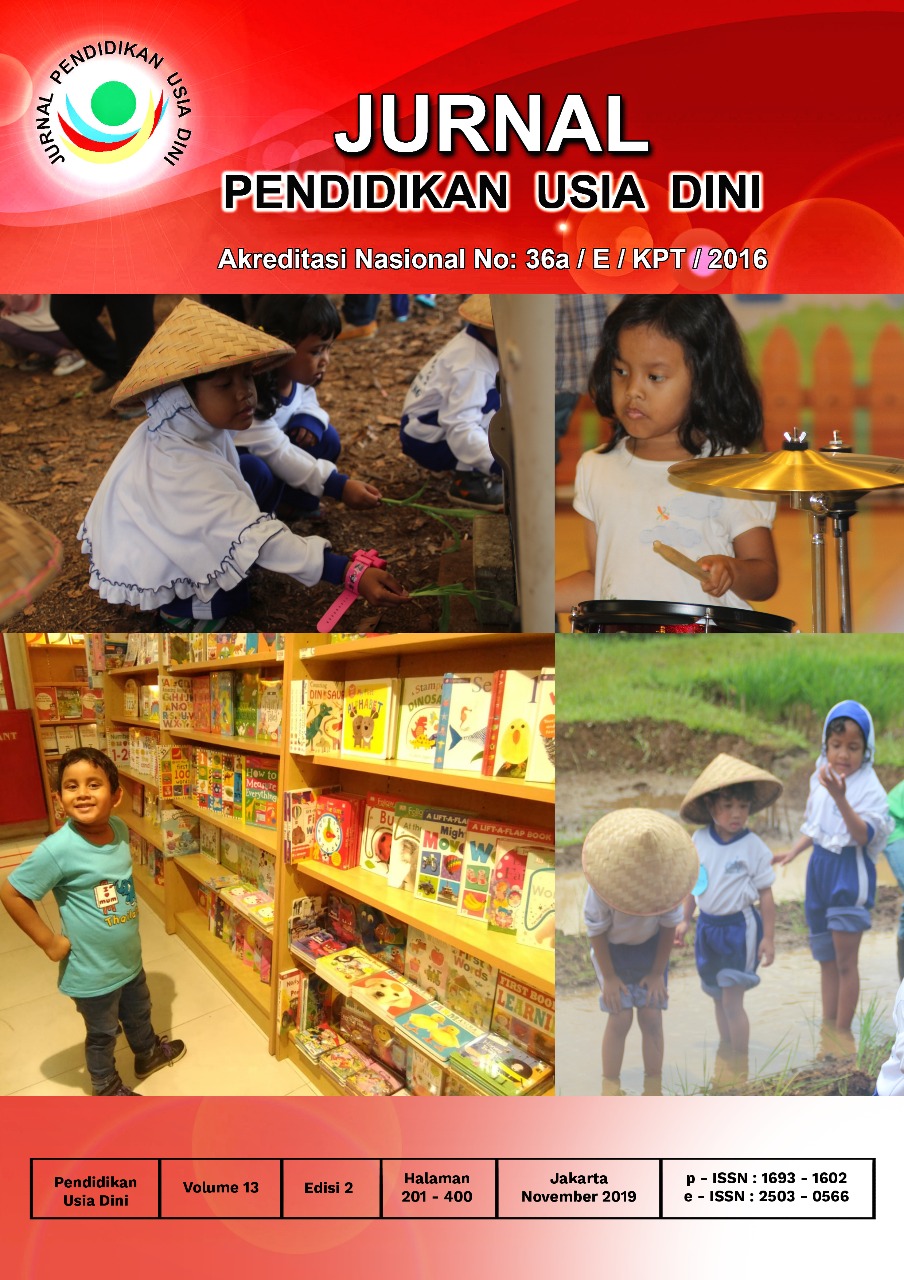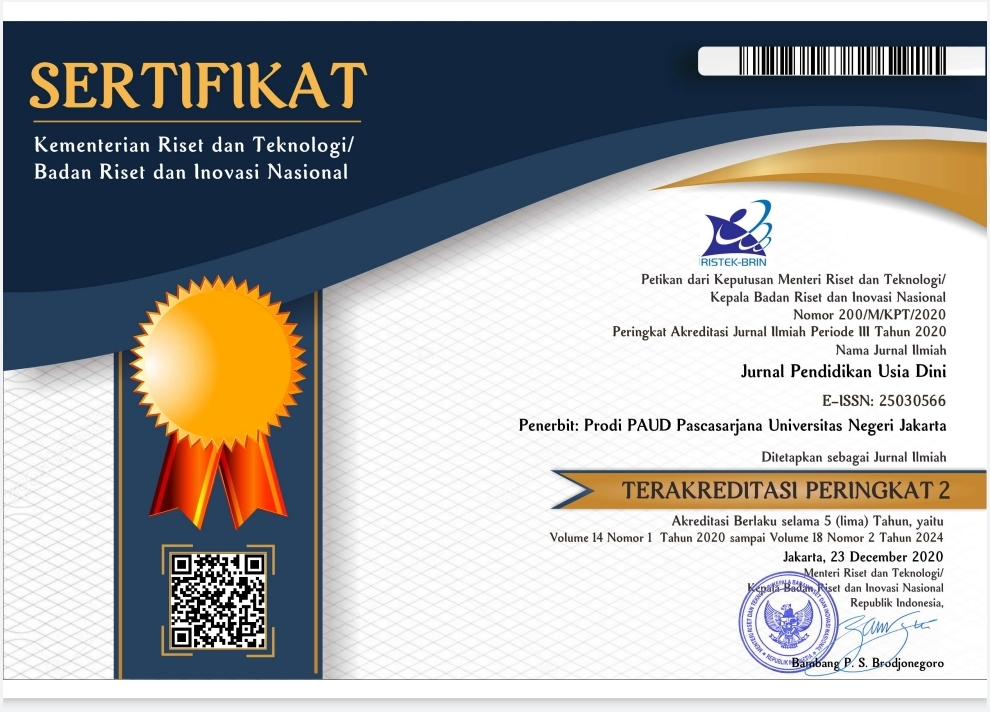Children's Outdoor Activities and Parenting Style in Children's Social Skill
DOI:
https://doi.org/10.21009/JPUD.132.02Abstract
Physical activity is very important for early childhood, especially outdoor activities that add a lot of new experiences. This study aims to check the relationship of children's outdoor activities and parenting styles and children's social skills. The participants are 125 parents of early childhood who attend kindergarten. The research method is a descriptive study using the relational screening model. The results showed that there was a relationship between outside play and parenting style on the social skills of children in their childhood. Democratic parenting styles are found to promote children's social skills, while authoritative parenting styles have a negative correlation with interpersonal skills, the ability to express verbally, self-control, listening skills, emotional management and adaptation to change. In the sub-dimensions of anger management and adaptation to changing skills is a significant difference between authoritative parenting styles and not permissive parenting with children's social skills.
Keywords: Early Childhood Social skills, Outdoor Activities, Parenting Styles
Reference:
Azlina, W., & S., Z. A. (2012). A Pilot Study: The Impact of Outdoor Play Spaces on Kindergarten Children. Procedia - Social and Behavioral Sciences, 38(December 2010), 275–283. https://doi.org/10.1016/j.sbspro.2012.03.349
Bento, G., & Dias, G. (2017). The importance of outdoor play for young childrenʼs healthy development. Porto Biomedical Journal, 2(5), 157–160. https://doi.org/10.1016/j.pbj.2017.03.003
Beyer, K., Bizub, J., Szabo, A., Heller, B., Kistner, A., Shawgo, E., & Zetts, C. (2015). Development and validation of the attitudes toward outdoor play scales for children. Social Science and Medicine, 133, 253–260. https://doi.org/10.1016/j.socscimed.2014.10.033
Boxberger, K., & Reimers, A. K. (2019). Parental correlates of outdoor play in boys and girls aged 0 to 12—A systematic review. International Journal of Environmental Research and Public Health, 16(2). https://doi.org/10.3390/ijerph16020190
Coleman, W. L., & Lindsay, R. L. (1992). Interpersonal disabilities: Social skill deficits in older children and adolescents: Their description, assessment, and management. Pediatric Clinics of North America, 39(3), 551–567. https://doi.org/10.1016/S0031-3955(16)38344-4
Cui, M., Janhonen-Abruquah, H., Darling, C. A., Carlos Chavez, F. L., & Palojoki, P. (2019). Helicopter Parenting and Young Adults’ Well-Being: A Comparison Between United States and Finland. Cross-Cultural Research, 53(4), 410–427. https://doi.org/10.1177/1069397118802253
Fjørtoft, I., & Sageie, J. (2000). The natural environment as a playground for children. Landscape description and analyses of a natural playscape. Landscape and Urban Planning, 48(1–2), 83–97. https://doi.org/10.1016/S0169-2046(00)00045-1
Ghanbari-Azarneir, S., Anbari, S., Hosseini, S.-B., & Yazdanfar, S.-A. (2015). Identification of Child-friendly Environments in Poor Neighborhoods. Procedia - Social and Behavioral Sciences, 201(February), 19–29. https://doi.org/10.1016/j.sbspro.2015.08.114
Giedd, J. N. (2012). The Digital Revolution and Adolescent Brain Evolution. Journal of Adolescent Health, 51(2), 101–105. https://doi.org/10.1016/j.jadohealth.2012.06.002
Hinkley, T., Brown, H., Carson, V., & Teychenne, M. (2018). Cross sectional associations of screen time and outdoor play with social skills in preschool children. PLoS ONE, 13(4), 1–15. https://doi.org/10.1371
Johnson, J. E., & Christie, J. F. (2009). Play and digital media. Computers in the Schools, 26(4), 284–289. https://doi.org/10.1080/07380560903360202
Junot, A., Paquet, Y., & Martin-Krumm, C. (2017). Passion for outdoor activities and environmental behaviors: A look at emotions related to passionate activities. Journal of Environmental Psychology, 53, 177–184. https://doi.org/10.1016/j.jenvp.2017.07.011
Kemple, K. M., Oh, J. H., Kenney, E., & Smith-Bonahue, T. (2016). The Power of Outdoor Play and Play in Natural Environments. Childhood Education, 92(6), 446–454. https://doi.org/10.1080/00094056.2016.1251793
Kol, S. (2016). The Effects of the Parenting Styles on Social Skills of Children Aged 5-6. Malaysian Online Journal of Educational Sciences, 4(2), 49–58.
Kozina, Z., Repko, O., Kozin, S., Kostyrko, A., Yermakova, T., & Goncharenko, V. (2016). Motor skills formation technique in 6 to 7-year-old children based on their psychological and physical features (Rock climbing as an example). Journal of Physical Education and Sport, 16(3), 866–874. https://doi.org/10.7752/jpes.2016.03137
Larson, L. R., Szczytko, R., Bowers, E. P., Stephens, L. E., Stevenson, K. T., & Floyd, M. F. (2019). Outdoor Time, Screen Time, and Connection to Nature: Troubling Trends Among Rural Youth? Environment and Behavior, 51(8), 966–991. https://doi.org/10.1177/0013916518806686
Lindsey, G., Maraj, M., & Kuan, S. C. (2001). Access, Equity, and Urban Greenways: An Exploratory Investigation. Professional Geographer, 53(3), 332–346. https://doi.org/10.1111/0033-0124.00288
Louv, R. (2008). Last child in the woods: Saving our children from nature-deficit disorder. Chapel Hill, NC: Algonquin Books.
Maynard, T., & Waters, J. (2007). Learning in the outdoor environment: A missed opportunity? Early Years, 27(3), 255–265. https://doi.org/10.1080/09575140701594400
Moreland, A. D., & McRae-Clark, A. (2018). Parenting outcomes of parenting interventions in integrated substance-use treatment programs: A systematic review. Journal of Substance Abuse Treatment, 89(August 2017), 52–59. https://doi.org/10.1016/j.jsat.2018.03.005
Moriguchi, Y., Zelazo, P. D., & Chevalier, N. (2016). Development of Executive Function During Childhood. https://doi.org/10.3389/978-2-88919-800-9
Mullenbach, L. E., Andrejewski, R. G., & Mowen, A. J. (2019). Connecting children to nature through residential outdoor environmental education. Environmental Education Research, 25(3), 365–374. https://doi.org/10.1080/13504622.2018.1458215
Norðdahl, K., & Einarsdóttir, J. (2015). Children’s views and preferences regarding their outdoor environment. Journal of Adventure Education and Outdoor Learning, 15(2), 152–167. https://doi.org/10.1080/14729679.2014.896746
Pinquart, M. (2016). Associations of Parenting Styles and Dimensions with Academic Achievement in Children and Adolescents: A Meta-analysis. Educational Psychology Review, 28(3), 475–493. https://doi.org/10.1007/s10648-015-9338-y
Riany, Y. E., Cuskelly, M., & Meredith, P. (2016). Cultural Beliefs about Autism in Indonesia. International Journal of Disability, Development and Education, 63(6), 623–640. https://doi.org/10.1080/1034912X.2016.1142069
Riany, Y. E., Meredith, P., & Cuskelly, M. (2017). Understanding the Influence of Traditional Cultural Values on Indonesian Parenting. Marriage and Family Review, 53(3), 207–226. https://doi.org/10.1080/01494929.2016.1157561
Saltali, N. D., & Arslan, E. (2012). Parent ’ s Attitudes as a Predictor of Preschoolers ’ Social Competence and Introverted Behavior. Elementary Education Online, 11(3), 729–737.
Schoeppe, S., Vandelanotte, C., Bere, E., Lien, N., Verloigne, M., Kovács, É., … Van Lippevelde, W. (2017). The influence of parental modelling on children’s physical activity and screen time: Does it differ by gender? European Journal of Public Health, 27(1), 152–157. https://doi.org/10.1093/eurpub/ckw182
Shi, Y. (2017). Explore Children’s Outdoor Play Spaces of Community Areas in High-density Cities in China: Wuhan as an Example. Procedia Engineering, 198(September 2016), 654–682. https://doi.org/10.1016/j.proeng.2017.07.118
Strasburger, V. C., Jordan, A. B., & Donnerstein, E. (2012). Children, Adolescents, and the Media:. Health Effects. Pediatric Clinics of North America, 59(3), 533–587. https://doi.org/10.1016/j.pcl.2012.03.025
Victoria J. Rideout, Foehr, M. A. U. G., & Roberts, D. F. (2010). GENERATION M2 Media in the Lives of 8- to 18-Year-Olds. In Theresa Boston (Ed.), Henry J. Kaiser Family Foundation. Boston: Henry J. Kaiser Family Foundation.
Wang, S. hua, Zhang, Y., & Baillargeon, R. (2016). Young infants view physically possible support events as unexpected: New evidence for rule learning. Cognition, 157, 100–105. https://doi.org/10.1016/j.cognition.2016.08.021
Waters, J., & Rekers, A. (2019). Young Children ’ s Outdoor Play-Based Learning. 1–7.
Webster-Stratton, C., Reid, J., & Hammond, M. (2001). Social skills and problem-solving training for children with early-onset conduct problems: Who benefits? Journal of Child Psychology and Psychiatry and Allied Disciplines, 42(7), 943–952. Retrieved from http://ovidsp.ovid.com/ovidweb.cgi?T=JS&PAGE=reference&D=emed5&NEWS=N&AN=2001380196
Wilkie, H. J., Standage, M., Gillison, F. B., Cumming, S. P., & Katzmarzyk, P. T. (2018). The home electronic media environment and parental safety concerns: relationships with outdoor time after school and over the weekend among 9-11 year old children. BMC Public Health, 18(1), 456. https://doi.org/10.1186/s12889-018-5382-0
Zajenkowska, A., Jankowski, K. S., Lawrence, C., & Zajenkowski, M. (2013). Personality and individual differences in responses to aggression triggering events among prisoners and non-prisoners. Personality and Individual Differences, 55(8), 947–951. https://doi.org/10.1016/j.paid.2013.07.467
Downloads
Published
How to Cite
Issue
Section
License
JURNAL PENDIDIKAN USIA DINI work is licensed under a Creative Commons Attribution 4.0 International License. (http://creativecommons.org/licenses/by/4.0/)





